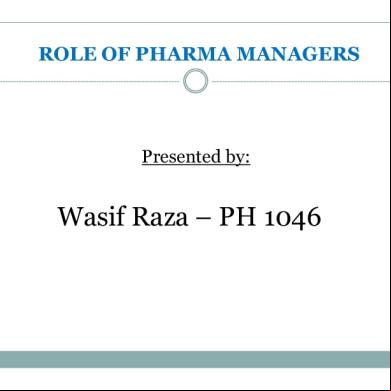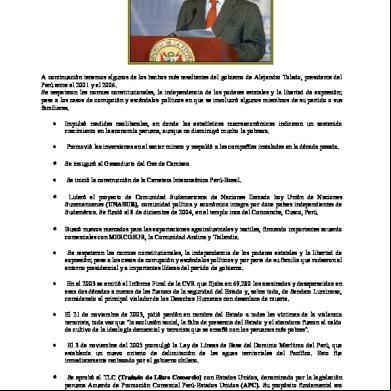Role Of Personnel Manager 6i123i
This document was ed by and they confirmed that they have the permission to share it. If you are author or own the copyright of this book, please report to us by using this report form. Report 3b7i
Overview 3e4r5l
& View Role Of Personnel Manager as PDF for free.
More details w3441
- Words: 874
- Pages: 4
Role of Personnel Manager or HR Manager by Sree Rama Rao on December 3, 2010 Human resources Managers, nowadays wear many hats. They perform mainly three different types of roles while meeting the requirements of employees and customers, namely istrative, operational and strategic. istrative Roles: The istrative roles of human resources management include policy formulation and implementation, housekeeping, records maintenance, welfare, istrative, legal compliance etc. 1.Policy maker: The human resource manager helps management in the formation of policies governing talent acquisition and retention, wage and salary istrative welfare activities, personnel records, working conditions etc. He also helps in interpreting personnel policies in an appropriate manner. 2.istrative expert: The istrative role of an HR Manager is heavily oriented to processing and record keeping. Maintaining employees file and HR related databases processing employee benefit claims, answering queries regarding leave, transport and medical facilities, submitting required reports to regulatory agencies are examples of the istrative nature of HR management. These activities must be performed efficiently and effectively to meet changing requirements of employees, customers and the government. 3.Advisor: It is said that personnel management is not a line responsibility but a staff function. The personnel manager performs his functions by advising, suggesting , counseling and helping the line managers in discharging their responsibilities relating to grievance redressal, conflict resolution, employee selection and training . Personnel advice includes preparation of reports, communication of guidelines for the interpretation and implementation of policies, providing information regarding labor laws etc. 4.Housekeeper: The istrative roles of a personnel manager in managing the show include recruiting pre-employment testing, reference checking, employee surveys, time keeping, wage and salary istration, benefits and pension istration wellness programs, maintenance of records etc. 5.Counselor: The personal manager discusses various problems of the employees relating to work, career their supervisors, colleagues, health, family, financial, social etc and advises them on minimizing and overcoming problems if any. 6.Welfare officer: Personnel manager is expected to be the Welfare Officer of the company. As a Welfare officer he provides and maintains (On behalf of the company) canteens, hospitals, crèches, educational institutes, clubs, libraries, conveyance facilities, co-operative credit societies
and consumer stores. Under the Factories Act, Welfare officers are expected to take care of safety, health and welfare of employees. The HR managers are often asked to oversee if everything is in line with the company legislation and stipulation. 7.Legal consultant: Personnel manager plays a role of grievance handling, settling of disputes, handling disciplinary cases, doing collective bargaining, enabling the process of t consultation interpretation and implementation of various labor laws, ing lawyers regarding court cases, filing suits in labor courts, industrial tribunals, civil courts and the like. In some organizations the above istrative functions are being outsourced to external providers in recent times, with a view to increasing efficiency as also cutting operational costs. Technology is being put to good use to automate many of the istrative tasks. Operational Roles: These roles are tactical in nature and include recruiting, training, and developing employees coordinating HR activities with the actions of managers and supervisors throughout the organizations and resolving differences between employees. 1.Recruiter: Winning the war for talent has become an important job of HR managers in recent times in view of the growing competition for people possessing requisite knowledge, skills and experience. HR managers have to use their experience to good effect while laying down lucrative career paths to new recruits without, increasing the financial burden to the company. 2.Trainer /developer/ motivator: Apart from talent acquisition talent retention is also important. To this end, HR managers have to find skill deficiencies from time to time, offer meaningful training opportunities, and bring out the latent potential of people through intrinsic and extrinsic rewards which are valued by employers. 3.Coordinator /linking pin: The HR manager is often deputed to act as a linking pin between various divisions / departments of an organization. The whole exercise is meant to develop rapport with divisional heads, using PR and communication skills of HR executives to the maximum possible extent. 4.Mediator: The personnel manager acts as a mediator in case of friction between two employees, groups of employees, superiors, and subordinates and employees and management with the sole objective of maintaining industrial harmony.
Challenges of Modern Personnel Management
Changing Mix of the Work force
Changing Personal Values of the Work force
Changing expectations of citizen-employees
Changing levels of productivity
Changing demands of government
Changing Mix of the workforce.
Increased numbers of minority entering occupations requiring greater skills.
Increasing levels of formal education for the entire work force.
More female employees.
More married female employees.
More working mothers.
A steadily increasing majority of white-collar employees in place of the blue-collar.
Changing Personal Values of the Work Force
Better morale
Better fit of work time to the employee’s “body clock”
Improving handling of fluctuating workloads
Increased customer service
Reduced employee absenteeism
Reduced turnover
Changing Expectations of Citizen-Employees o
Freedom of Speech
o
Right to privacy
Changing Levels of Productivity o
Numerous laws
o
Increase in new numbers of employees
o
Adversial relations with labour unions
Changing Demands of Government o
In procurement
o
Development
o
compensation,
o
integration,
o
maintenance
o
separation.
and consumer stores. Under the Factories Act, Welfare officers are expected to take care of safety, health and welfare of employees. The HR managers are often asked to oversee if everything is in line with the company legislation and stipulation. 7.Legal consultant: Personnel manager plays a role of grievance handling, settling of disputes, handling disciplinary cases, doing collective bargaining, enabling the process of t consultation interpretation and implementation of various labor laws, ing lawyers regarding court cases, filing suits in labor courts, industrial tribunals, civil courts and the like. In some organizations the above istrative functions are being outsourced to external providers in recent times, with a view to increasing efficiency as also cutting operational costs. Technology is being put to good use to automate many of the istrative tasks. Operational Roles: These roles are tactical in nature and include recruiting, training, and developing employees coordinating HR activities with the actions of managers and supervisors throughout the organizations and resolving differences between employees. 1.Recruiter: Winning the war for talent has become an important job of HR managers in recent times in view of the growing competition for people possessing requisite knowledge, skills and experience. HR managers have to use their experience to good effect while laying down lucrative career paths to new recruits without, increasing the financial burden to the company. 2.Trainer /developer/ motivator: Apart from talent acquisition talent retention is also important. To this end, HR managers have to find skill deficiencies from time to time, offer meaningful training opportunities, and bring out the latent potential of people through intrinsic and extrinsic rewards which are valued by employers. 3.Coordinator /linking pin: The HR manager is often deputed to act as a linking pin between various divisions / departments of an organization. The whole exercise is meant to develop rapport with divisional heads, using PR and communication skills of HR executives to the maximum possible extent. 4.Mediator: The personnel manager acts as a mediator in case of friction between two employees, groups of employees, superiors, and subordinates and employees and management with the sole objective of maintaining industrial harmony.
Challenges of Modern Personnel Management
Changing Mix of the Work force
Changing Personal Values of the Work force
Changing expectations of citizen-employees
Changing levels of productivity
Changing demands of government
Changing Mix of the workforce.
Increased numbers of minority entering occupations requiring greater skills.
Increasing levels of formal education for the entire work force.
More female employees.
More married female employees.
More working mothers.
A steadily increasing majority of white-collar employees in place of the blue-collar.
Changing Personal Values of the Work Force
Better morale
Better fit of work time to the employee’s “body clock”
Improving handling of fluctuating workloads
Increased customer service
Reduced employee absenteeism
Reduced turnover
Changing Expectations of Citizen-Employees o
Freedom of Speech
o
Right to privacy
Changing Levels of Productivity o
Numerous laws
o
Increase in new numbers of employees
o
Adversial relations with labour unions
Changing Demands of Government o
In procurement
o
Development
o
compensation,
o
integration,
o
maintenance
o
separation.










